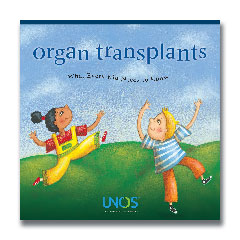Transplantation in children involves many considerations. Most children are smaller than adults and they are constantly growing and developing. Children may have emotional and medical needs that pediatric transplant professionals are trained to understand and address.
If you want to find a transplant center that specializes in pediatric transplants, go to the Scientific Registry for Transplant Recipients website to learn more and compare outcomes.
When discussing an upcoming transplant, consider the child’s age and maturity-level. The following guidelines may be helpful:
Infants and toddlers
It is very difficult to prepare an infant for a medical procedure. Older toddlers, however, may understand simple explanations. Regardless of age, the importance of creating a familiar and comfortable atmosphere in the hospital is crucial. While away from home, infants and toddlers will benefit from having family members with them as much as possible. Having familiar toys, videos or a favorite blanket can also help the child feel more at home.
Preschool
Preschool children can benefit from pre-hospitalization teaching. When explaining medical procedures to preschoolers, it is important to use reassuring vocabulary and simple explanations. In addition, because children are very aware of their parent’s feelings, it is important to stay positive. For more ideas, view our brochure, Organ Transplants: What Every Kid Needs to Know now >
Play therapists, nurses and other members of your transplant team can also assist in helping your child understand certain topics and cope with the varying stress related to illness and transplantation.
It may be useful to keep a diary that records your child’s tests and operations to show them when they are older.
School age
School-age children can benefit from pre-hospitalization teaching. In addition, because young children sometimes think an illness is punishment for something they have done, it is important to let young children know that the illness is not their fault.
When preparing your child for their medical procedure, it is important that you always answer their questions simply and truthfully, and unless they ask, not overload them with too many details.
- Encourage your child and their siblings to ask questions about anything that is worrying them.
- Take tours of the clinic, hospital room and ICU
- Allow your child to meet and speak to personnel from these areas can help to alleviate fears of the unknown
- Inform your child about the types of tubes that will be used, what the incision will look like, what the typical hospital stay is like and what types of medication they will take after transplantation
Adolescents
Dealing with an illness, in addition to helping your child handle stress associated with the transition from childhood to adulthood, can be very difficult. That’s why supportive communication and careful preparation with this age group is especially important.
- Encourage your child to talk about his or her feelings. Listen when your child is talking and acknowledge his or her feelings as being real.
- Don’t be afraid to ask your doctors and nurses to simplify complicated medical jargon and draw pictures if necessary.
- Prepare your child for the reactions of others. Parents can help their children by suggesting various simple and concise explanations.
- Additional help, like a therapist or psychologist, can often engage your child in conversation that they may not share with you.
- Encourage your child to tell their friends about the upcoming surgery so they can be a source of support.
- During the hospitalization, encourage friends, classmates and family members to visit or write to maintain communication.
Reference and Publication Information
This Web site is intended solely for the purpose of electronically providing the public with general health-related information and convenient access to the data resources. UNOS is not affiliated with any one product nor does UNOS assume responsibility for any error, omissions or other discrepancies.

